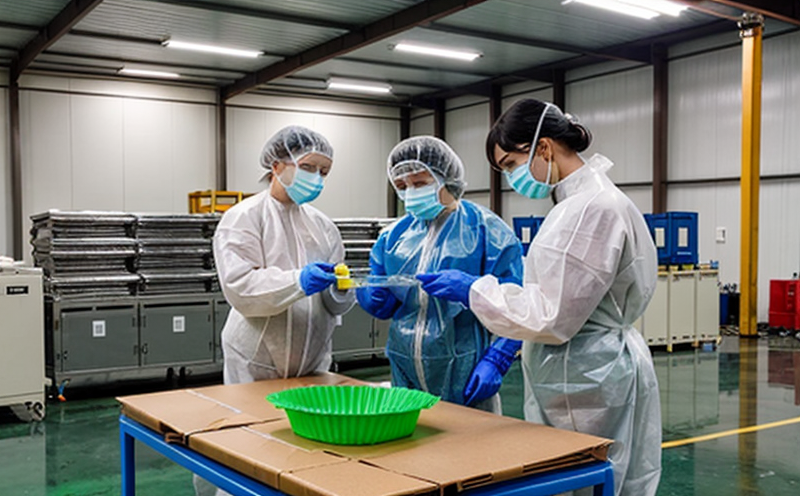ISO 11357 Differential Scanning Calorimetry DSC Testing Limit of Detection and Quantitation Assessment Test
The ISO 11357 standard provides a framework for the use of differential scanning calorimetry (DSC) to determine the limit of detection (LOD) and quantitation (LOQ) in plastic packaging materials. This testing is crucial for ensuring that the analytical methods used in quality control and R&D are sensitive enough to detect trace amounts of additives, contaminants, or impurities without false positives.
Differential Scanning Calorimetry (DSC) is a thermal analysis technique where the difference in heat flow between an empty reference sample holder and a sample undergoing temperature change is measured. This method allows for precise measurement of specific heat capacity changes during heating and cooling, making it ideal for detecting subtle differences that are indicative of impurities or additives.
Understanding LOD and LOQ is essential because it ensures the reliability and accuracy of analytical results. A high LOD means that there is a significant amount of material present before any detectable change can be observed, while a low LOQ indicates that small quantities of materials can be accurately quantified. This testing helps manufacturers comply with strict regulatory requirements, ensuring product quality and safety.
For plastic packaging, DSC testing can reveal impurities such as residual monomers or catalysts left over from the production process. These residues could potentially affect the performance of the final product. By using ISO 11357 DSC testing, companies can ensure that their materials meet the necessary standards and are free from harmful substances.
The test involves precise sample preparation, typically involving small quantities of plastic samples cut to standard dimensions. The samples are then placed in a DSC instrument for analysis. During this process, the temperature is gradually increased or decreased while monitoring the heat flow difference between the sample and an empty reference. The results provide insights into thermal transitions within the material, such as melting points, glass transition temperatures, and crystallization.
ISO 11357 DSC testing is particularly important for identifying trace amounts of additives like plasticizers or antioxidants that may impact the performance characteristics of packaging materials. These tests help in understanding how these small quantities influence the overall properties of the material, such as flexibility, durability, and resistance to environmental factors.
The accuracy and precision of ISO 11357 DSC testing are vital for ensuring consistent product quality across production batches. By setting clear limits on LOD and LOQ, companies can maintain high standards in their manufacturing processes. This ensures that any deviations from the expected performance characteristics are immediately identified and addressed.
In conclusion, ISO 11357 DSC testing is a critical tool for plastic packaging manufacturers to ensure compliance with international standards and to enhance product quality. It provides valuable insights into the composition of materials used in packaging, helping companies stay ahead of regulatory requirements and market demands.
Why It Matters
The importance of ISO 11357 DSC testing cannot be overstated. By accurately determining the LOD and LOQ in plastic packaging materials, companies can ensure that their analytical methods are reliable and robust. This is particularly crucial in industries where even small amounts of impurities or additives can significantly impact product performance.
For quality managers and compliance officers, ensuring that all testing meets international standards like ISO 11357 is essential for maintaining a high standard of product integrity. R&D engineers benefit from this testing as it helps in identifying potential issues early in the development process, allowing for timely adjustments to formulations or processes.
Procurement teams also find value in this testing, as it ensures that the materials they source meet stringent quality criteria. By using ISO 11357 DSC testing, companies can avoid costly errors and ensure that their products are safe and effective.
The LOD and LOQ values obtained from this test provide a benchmark for acceptable levels of contamination or additives in plastic packaging. This helps in setting realistic expectations for manufacturing processes and quality control. By adhering to these standards, companies can enhance the overall reliability and safety of their products.
Moreover, ISO 11357 DSC testing supports ongoing quality improvement initiatives by providing data that can be used to refine production techniques and materials selection. This continuous improvement approach ensures that products are not only compliant with regulations but also meet or exceed customer expectations.
Benefits
- Enhanced Product Quality: Ensures that plastic packaging materials meet the required standards and do not contain harmful impurities or excessive additives.
- Regulatory Compliance: Helps companies comply with international standards, avoiding potential legal issues and penalties.
- Better Process Control: Provides insights into production processes, enabling early detection of any deviations from expected performance characteristics.
- Improved Efficiency: By identifying and addressing issues early in the development or manufacturing process, companies can reduce waste and improve overall efficiency.
Eurolab Advantages
Eurolab offers unparalleled expertise in ISO 11357 DSC testing for plastic packaging. Our team of experienced scientists and engineers ensures that every test is conducted with precision and accuracy, providing clients with reliable data they can trust.
We use state-of-the-art equipment to perform these tests, ensuring that our results are consistent and repeatable. Our laboratories adhere strictly to ISO standards, guaranteeing the highest level of quality in all our testing processes.
Our team provides comprehensive support throughout the entire testing process, from sample preparation to data interpretation. We also offer detailed reports and recommendations based on our findings, helping clients make informed decisions about their packaging materials.





